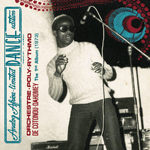|
|
 |
Dusted Reviews
Artist: Orchestre Poly-Rythmo de Cotonou / ROB Album: The First Album / Funky Rob Way Label: Analog Africa Review date: Sep. 14, 2011 |

|
|
|
 |
Benin’s Orchestre Poly-Rythmo de Cotonou may have been the most sonically prescient African electric band of the 1970s. The collective’s amalgam of Afro-beat, highlife and ancient local rhythms remains fresh, timeless even, nearly 40 years on, a perhaps unintended map or blueprint for later — and geographically distant — musical journeys and constructions.
The band’s first full-length album, made in 1973 under the leadership of singer/frontman Vincent Ahehehinnou, offers evidence of this from the very first track. “Ou C´est Lui Ou C´est” is built upon a hypnotic and exhilarating groove. The massed percussion and electric bass are relentless and thick, yet also charged with a flowing and lifting energy, as tape-doubled lead vocals, gruff and rhythmic saxophone, and an extended, adventurous — psychedelic, even — wah-wah’d combo organ excursion take turns riding the strong groove.
Poly-Rythmo recorded singles for many small labels at home in Benin, and by most accounts, was a band that knew just what it wanted sonically, and getting the chance to experience a bigger scene and a better-equipped studio in Lagos, Nigeria, to record its first LP might well have upped the game. The band seems to have tailored their arrangements to make full use of the higher-resolution sound quality and wider dynamic range at hand.
Fellow Analog Africa reissue Funky Rob Way by Ghanaian singer ROB is a very different amalgam, but perhaps one of ’70s West Africa’s strangest and most fascinating albums. Under the musical direction of Ghanaian Army highlife bandleader and arranger Amponsah Rockson , ROB variously murmurs, croons and exhorts his way through spacious — and sometimes spartan — disco/Afro-beat tracks. There’s a kind of radical cosmic funk on display here: Repeating elements are staggered, shifted, and shuffled with sharp precision; wah-wah and other ’70s electronic textures are ubiquitous, utilized in adventurous and exciting ways.
The deep West African psychedelia/funk of these two records might make one wonder for a moment if some of these sounds had somehow, somewhere crossed paths with Miles Davis’ Pangaea/Agartha band. But it’s more likely that it’s simply the powerful cosmic energy of a time and place we’re hearing— seamless sounds from an inventive and inspired time and space, delivered in spirit and flesh forever via magnetic tape.
By Kevin Macneil Brown
|







